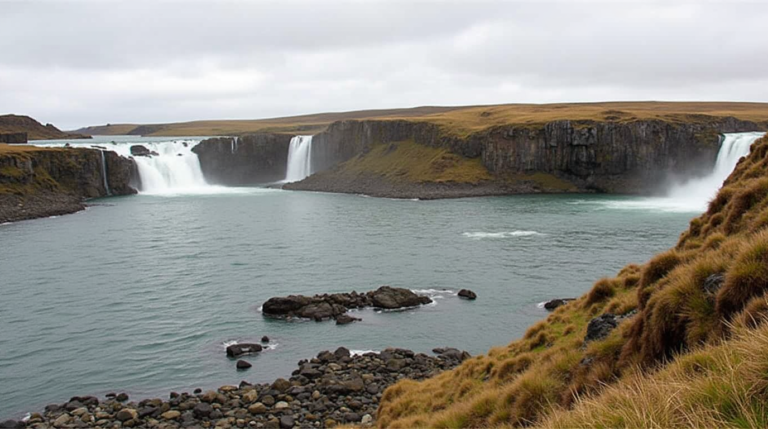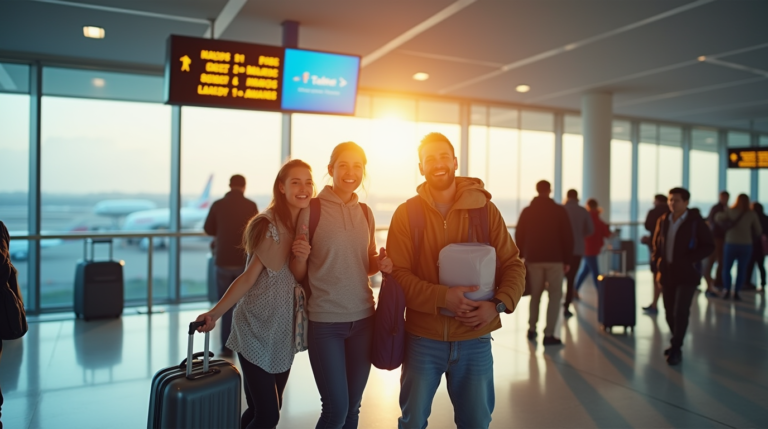10 Travel Tips for Beginners
Table of Contents
The Ultimate Guide to Travel Tips for First-Time Travelers and Beyond
Embarking on a journey, whether domestic or international, opens doors to new experiences and cultures. However, the excitement of travel often comes with a side of anxiety, especially for first-timers. This comprehensive guide aims to equip you with essential travel tips that will help you navigate your adventures with confidence and ease.
Introduction to Travel Tips
Setting sail on your first international or domestic trip can feel overwhelming. The unfamiliar terrain, different cultures, and logistics of travel planning might seem daunting at first glance. However, with proper research and practical travel tips, you can transform that overwhelming feeling into excitement and anticipation.
Travel is not just about the destination but also about the journey. Being prepared helps you enjoy both aspects fully. Let’s dive into essential travel tips that will make your adventures smoother and more enjoyable.
Travel Tips for Beginners
If you’re new to traveling, these foundational tips will help set you up for success:
1. Plan Your First Night in Detail
After hours of travel, the last thing you want is confusion about where to stay or how to get there. Book your first night’s accommodation in advance and have clear directions on how to reach it from your arrival point. Save offline maps and have your hotel’s phone number handy.
2. Document Security is Essential
Make photocopies of important documents like your driver’s license, passport, visa, and vaccination records. Keep physical copies separate from the originals in your luggage, and store digital scans in the cloud for easy access if something gets lost or stolen.
3. Prepare Essential Items Before Departure
Purchase adapters, SIM cards, and currency at home rather than at your destination. Not only will you typically get better rates, but you’ll also avoid the stress of hunting for these essentials in an unfamiliar place when you’re likely to be jet-lagged.
4. Notify Financial Institutions
Alert your credit card companies and banks about your travel plans to prevent them from flagging foreign transactions as suspicious. While you’re at it, inquire about overseas transaction fees and consider obtaining cards with travel-friendly policies.
5. Check Mobile Phone Coverage
Contact your phone carrier to understand your international service options, or research getting a local SIM card at your destination. Staying connected is crucial for navigation, translation, and emergency situations.
6. Plan for Internet Access
If you need to work while traveling, invest in a travel Wi-Fi hotspot and an international data plan. This ensures you’ll have reliable internet access regardless of your accommodation’s Wi-Fi quality.
7. Document Your Experiences
Pack a travel journal to record your experiences, impressions, and encounters. Years later, these personal accounts will be treasured more than photographs alone.
8. Pack Strategically for Comfort and Contingencies
Choose versatile clothing in darker colors that can be mixed and matched. Always pack a change of clothes in your carry-on, along with any necessary medications, in case your checked luggage is delayed or lost.
9. Bridge Language Gaps
Even if you’re somewhat fluent in the local language, bring a physical phrasebook. Your translation app might not be accessible if your phone dies or you don’t have internet connectivity.
10. Embrace the Experience with a Positive Attitude
Above all, smile and approach your journey with enthusiasm! A positive attitude can transform challenges into adventures and help you connect with locals and fellow travelers alike.
Short Travel Tips for Quick Getaways
When time is limited, maximizing your experience becomes even more important:
Research and Prioritize
Research your destination thoroughly before arrival and create a prioritized list of experiences. For short trips, focus on quality over quantity—it’s better to deeply enjoy a few activities than to rush through many.
Pack Light and Smart
Avoid overpacking for short trips. Wear your bulkiest shoes while traveling and pack versatile clothing that can be dressed up or down. Stick to travel-size toiletries to save space.
Entertainment for the Journey
Choose Accommodations Wisely
For short trips, consider splurging on accommodations in central locations. The time saved on commuting means more time enjoying your destination.
Consider Alternative Transportation
For shorter distances, take the scenic route or travel by train. These options often provide unique views and experiences that flying doesn’t offer.
Domestic Travel Safety Tips
Safety should always be a priority, even when traveling within your own country:
Protect Your Valuables
Avoid carrying or wearing unnecessary valuables to reduce the risk of theft. When using public transportation, keep bags on your lap rather than on the floor or in overhead compartments.
Research Accommodations Thoroughly
Ensure you’re staying in a safe area by reading multiple reviews from different platforms and seeking advice from locals or experienced travelers.
Keep Someone Informed
Share your itinerary with a trusted person back home and schedule regular check-ins. Consider sharing your location with family members for added security.
Follow Health Guidelines
Adhere to all COVID-19 restrictions and requirements at your destination, which may differ from those in your home area. This includes mask mandates, vaccination requirements, and testing protocols.
Prioritize Health
Don’t travel if you’re feeling unwell or have recently been exposed to contagious illnesses. This protects both you and others.
International Travel Tips
International travel brings additional considerations:
Allow Extra Time at Airports
Arrive at least three hours early for international flights to account for additional security procedures, potential language barriers, and unfamiliar airport layouts.
Prepare Entertainment for Long Flights
Download e-books, movies, or shows before your flight, as Wi-Fi on international flights can be expensive or unavailable.
Stay Charged
Pack a portable charger as outlets may be limited on planes and in airports. Different countries also have varying outlet types, making your adapter crucial.
Plan Your Arrival Transportation
Research and decide how you’ll get from the airport to your accommodation before you land. This is especially important if you’re arriving late at night or in a country where you don’t speak the language.
Be Mindful of Luggage on Trains
On train travel, you’re responsible for your luggage. Choose maneuverable luggage and avoid overpacking to make transitions smoother.
Register with Your Embassy
U.S. citizens should register with the Smart Traveler Enrollment Program (STEP) at the nearest U.S. embassy. This ensures you receive alerts and can be contacted in emergencies.
Purchase Comprehensive Travel Insurance
Invest in travel insurance that covers trip cancellation, medical emergencies, and evacuation. The cost is minimal compared to potential expenses if something goes wrong.
Combat Jet Lag Proactively
Adjust to the local time as quickly as possible. Exercise, spending time outdoors, and staying hydrated can help minimize the effects of jet lag.
Stay Updated on Entry Requirements
Review the entry requirements for your destination country regularly, as these can change. Check again shortly before departure to avoid surprises.
Safe Travel Tips During COVID-19
The pandemic has added new layers to travel planning:
Stay Informed About Restrictions
Use resources like the Kayak international travel restrictions map to stay updated on entry requirements, which may include testing, vaccination proof, or quarantine periods.
Check Local Regulations
For domestic travel, remember that restrictions can vary not just by state but by county and municipality.
Maintain Preventive Measures
Don’t abandon necessary precautions: stay current with vaccinations and boosters, practice social distancing, avoid contact with sick individuals, quarantine if exposed or ill, sanitize hands frequently, and wear masks in crowded or indoor public spaces.
Travel Tips for Packing Efficiently
Packing well can make or break your travel experience:
Choose Versatile Clothing
Build your travel wardrobe around neutral-colored separates that can be mixed and matched to create different outfits.
Maximize Space with Rolling Technique
Roll your clothes instead of folding them to maximize suitcase space and minimize wrinkles.
Research Destination Conditions
Check not just the temperature but specific conditions like rainy seasons, wind factors, or high UV index that might affect what you pack.
Prioritize Comfort and Layering
Pack comfortable shoes and clothes that work well in layers to accommodate temperature changes. Wear your bulkiest shoes during travel to save suitcase space.
Organize with Packing Tools
Use packing cubes or separate travel cases for different categories of items: one for toiletries, another for electronics, and so on.
Avoid Overpacking
Leave some space in your suitcase to avoid excess weight fees and to accommodate any souvenirs or purchases you make during your trip.
Consider Local Purchases
For longer trips, consider buying toiletries at your destination rather than packing large quantities.
Follow Aviation Liquid Rules
Remember the 3-1-1 rule for carry-on liquids when flying: 3.4-ounce (100ml) containers or smaller, placed in a 1-quart clear plastic bag, with 1 bag per passenger.
Ship Bulky Items Ahead
For extended stays or special needs, consider shipping bulky items to your destination in advance.
Traveling Tips for Students
Students have unique opportunities and constraints when it comes to travel:
Explore Academic Travel Programs
Research semester abroad programs, summer study options, and exchange programs offered through your educational institution.
Seek Affordable Opportunities
Look into programs that offer free or reduced-cost travel experiences, including grants, scholarships, and work-study options.
Combine Work and Travel
Consider part-time tutoring on campus to save for travel, or find paid summer internships abroad that provide both income and international experience.
Document Your Experiences
Starting a student travel blog can not only document your journey but potentially create income through partnerships or advertising.
Embrace Budget Accommodations
Hostels provide affordable lodging and excellent opportunities to meet fellow travelers. Some even offer work-exchange programs where you can trade a few hours of work for free accommodation.
Unique Travel Tips for Better Preparation
Go beyond the basics with these distinctive preparation strategies:
1. Immerse Yourself Before Departure
Start listening to podcasts about your destination’s history, culture, or current events before leaving home. This provides context that enhances your experience once you arrive.
2. Read Relevant Literature
Look up historical fiction or biographies of key figures from your destination country. This adds depth to your understanding of the places you’ll visit.
3. Connect with Fellow Travelers
Join social media groups centered around your destination to gather recent insights, ask questions, and potentially connect with locals or other travelers.
4. Book Guided Experiences
Schedule walking tours early in your trip to get oriented and gain insights from knowledgeable guides. This helps you identify areas you’d like to explore further.
5. Engage in Cultural Learning
Take a cooking class or other culturally immersive activity to connect more deeply with local traditions and customs.
Traveling to Japan for the First Time
Japan offers a fascinating blend of ancient traditions and cutting-edge modernity. Here’s what first-time visitors should know:
Understanding Japanese Culture
Learn basic cultural norms: bowing as a greeting, removing shoes in homes and some restaurants, proper chopstick and tatami etiquette, bathroom protocols, and appropriate behavior at temples and shrines.
Budget Planning
A week in Japan typically costs between $1,500-$2,500 per person, including accommodations, food, transportation, and activities. Costs can vary greatly depending on your travel style and the season.
Entry Requirements
Check visa requirements based on your nationality and duration of stay. Most Western countries have visa waiver agreements for tourist visits under 90 days. Ensure your passport is valid for the duration of your stay and beyond.
Best Times to Visit
Spring (March-May) offers cherry blossoms but comes with crowds. Summer (June-August) features festivals but can be hot and humid. Fall (September-November) showcases beautiful foliage. Winter (December-February) is ideal for skiing and hot springs.
Regional Highlights
Explore diverse regions: Hokkaido for natural beauty and winter sports; Honshu for major cities like Tokyo, Kyoto, and Osaka; Shikoku for pilgrimage routes; and Kyushu for hot springs and historic sites.
Getting There and Around
Fly into major international airports like Tokyo’s Narita or Haneda, Osaka’s Kansai, or Nagoya’s Centrair. Within Japan, the extensive rail network is efficient and comfortable. Consider a Japan Rail Pass for significant savings on long-distance travel.
Accommodation Options
Japan offers everything from luxury hotels to budget hostels, along with unique experiences like traditional ryokan (inns) and capsule hotels. Major cities provide the widest range of options.
Must-See Destinations
Prioritize iconic experiences: Tokyo’s blend of modern and traditional, Kyoto’s temples and gardens, Osaka’s food scene, and Hiroshima’s moving Peace Memorial Park.
Culinary Exploration
Sample Japan’s diverse cuisine beyond sushi: try ramen, tempura, okonomiyaki (savory pancakes), takoyaki (octopus balls), and kaiseki (traditional multi-course meals).
Dining Options
Explore various dining venues from high-end restaurants to convenience stores (which offer surprisingly good food in Japan), local markets, and familiar fast-food chains with Japanese twists.
Understanding Travel Health Insurance and Accidental Death Benefits
Comprehensive insurance provides peace of mind when traveling:
Accidental Death and Dismemberment (AD&D) Coverage
This benefit provides financial protection if you die or lose limbs or eyesight due to an accident during your travels. Coverage typically applies only to immediate death or dismemberment directly resulting from an accident.
Eligibility Considerations
AD&D benefits usually apply only if death occurs within a specific timeframe after the accident (often 365 days) and is solely caused by the accident without contribution from illness. Exclusions may apply for common carrier accidents or other policy-specific situations.
Policy Documentation
Carefully review policy documents to understand full benefits, exclusions, and claims processes before purchasing travel insurance.
Important Coverage Definitions
Understand key terms like accidental death (death resulting directly from an accident), accidental dismemberment (loss of limbs), loss of limb (physical separation or total loss of function), and loss of eye (complete, irrecoverable loss of sight).
Common Exclusions
Most policies exclude deaths resulting from infections, intoxication, mental health disorders, participation in riots, pregnancy complications, suicide, terrorism, or voluntary drug use. Review your specific policy for details.
Assessing Your Need for Coverage
Consider factors like your destination’s healthcare quality, your existing health conditions, planned activities, and potential financial impact on dependents when deciding on coverage levels.
Repatriation Coverage
Note that repatriation of remains is typically a separate benefit from AD&D and is worth confirming when purchasing insurance.
Flight Accident Coverage
Some policies include specific coverage for accidents on common carriers like commercial flights, often with higher benefit limits than general AD&D coverage.
Age-Specific Coverage Limits
Be aware that AD&D benefit amounts often vary by age group, with reduced benefits for younger travelers (under 18) and older travelers (typically over 65 or 70).
Conclusion
Travel opens minds, creates memories, and builds connections that last a lifetime. By implementing these tips, you’ll navigate your journey with greater confidence and less stress, allowing you to focus on what truly matters—experiencing the world in all its diversity and wonder.
Remember that flexibility and a positive attitude are perhaps your most valuable travel assets. No amount of planning can prevent all surprises, but being prepared helps you handle unexpected situations with grace.
Whether you’re planning your first trip or are a seasoned traveler looking to refine your approach, these strategies will help you travel more safely, efficiently, and enjoyably. Bon voyage!







